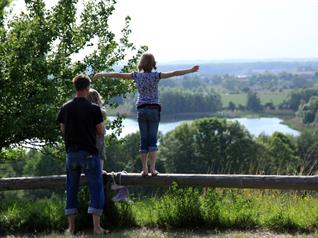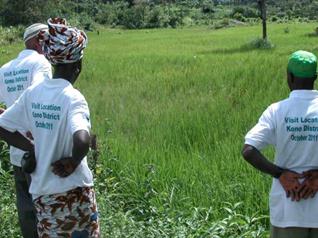 Back to the homepage of the research area
Back to the homepage of the research area
Contribution to ZALF research
The focus of Research Area 3 “Agricultural Landscape Systems“ is on science-based methods and applications of integrating the systems’ understanding of biophysical and socio-economic processes in agricultural landscapes into knowledge required for decision making. Two aspects are central to this: firstly, systems’ approaches are used, in the analysis of agricultural management as it interacts with landscapes and the food system. Secondly, a forward-looking perspective is adopted, in which future developments and trends (e.g. climate change, digitalisation, agricultural and climate policies, dietary habits) are anticipated, options and strategies for farming and land use systems are proposed and their impacts assessed.
The central research questions addressed in Research Area 3 "Agricultural Landscape Systems" include:
- How do different systems and their interlinkages develop and what contribution can they make at landscape level to contribute to sustainable development? Which determinants and patterns do they follow? How can they be strengthened in urban rural relationships? How do land uses, the supply chain and food systems interact and how can they be coordinated in such a way that regional sustainable development is reinforced?
- How can modelling approaches of cropping systems be combined to generate insights to support improved incomes, build climate resilience and promote biodiversity and reduced environmental impacts across different spatio-temporal scales?
- How can future developments of farming systems (e.g. cultivation technologies, autonomous machinery, modified crop rotations, agroforestry systems) be anticipated, integrated into future scenarios together with other drivers, and evaluated with respect to their impact on resource efficiency (water, land, energy, raw materials, cost) and ecosystem services under changing framework conditions (e.g. climate change, policy)? Which indicators are suitable when the analytical knowledge basis is scarce?

Working groups
Impact Assessment of Land Use Changes
Impact Assessment synthesises research to decision-relevant knowledge. By focussing on the Sustainable Development Goals (SDG), the working group couples the two approaches of impact and sustainability assessment. Emphasis is placed on assessing the impacts of soil cultivation and soil functions in the context of sustainable intensification. Indicators are developed to analyse contributions to the SDG at different spatiotemporal scales. The working group also evaluates future developments of soil cultivation using foresight studies and scenario development. Moreover, the working group investigates if and how impact assessment may be used to analyse the impacts of research itself.
Head of the working group: Prof. Dr. Katharina Helming
Spatial and system context

We examine agriculture and its actors in their interaction with the surrounding landscape and the agri-food system. We analyse transformations at regional scale and integrate prospective perspectives. We develop cooperative strategies for more sustainable agricultural landscape systems together with stakeholders. Our research questions are: How do new systems develop and what contribution can they make at landscape level to achieve sustainability objectives? Which determinants and patterns do they follow? How to coordinate and strengthen them via urban-rural interaction?
Head of the working group:
Dr. Maria Lee Kernecker
Integrated Crop System Analysis

Integrated food security, environmental or climate change impact assessments of cropping systems require simultaneous consideration of physiological, biophysical and socio-economic determinants of crop productivity, land use and ecosystem services. The core aim of this working group is to develop approaches, methods and models to improve the utility of biophysical cropping system analysis in integrated assessments, across a range of scales, to support the development of sustainable and resilient cropping systems. Two particular focus areas are the improved consideration of crop management in integrated assessments and representation of crop temperature for climate change impact studies.
Head of the working group: Prof. Dr. Heidi Webber
Farm Economics and Ecosystem Services
The focus of this working group lies on the analysis, modelling and valuation of agricultural decision-making behaviour at different spatial and temporal scales. It is investigated how changing conditions affect the decision making of land users, which consequences the resulting land use regime has for the respective ecosystems, and how land use can be made more competitive and efficient under given conditions. The working group employs mathematical models and empirical methods to conduct technology and policy impact assessments both at farm and regional levels and in national and international case studies.
Head of the working group:
Dr. Peter Zander
Contact:
Dr. Sandra Uthes - Bioeconomic modelling of farms for technology and policy impact assessment
Dr. Ali Hosseini - Model-based analysis of global-local interactions to increase ecosystem services
Dr. Fatima Lehnhardt - Production and behavioural economics for modelling decision-making processes at farm level
Dr. Johannes Schuler - Agricultural systems analysis in developing countries
 Back to the homepage of the research area
Back to the homepage of the research area
